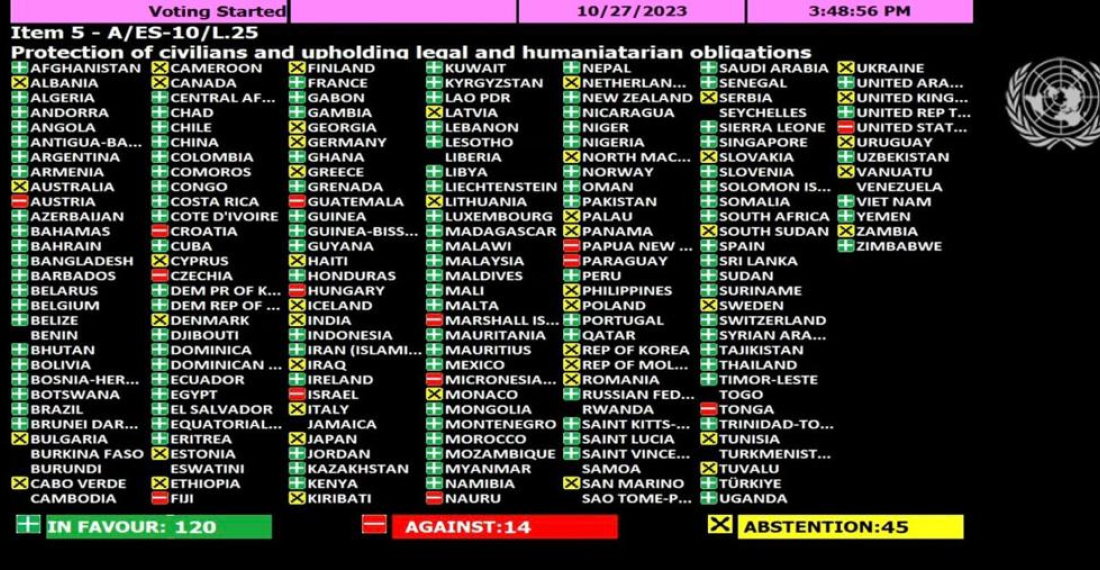The United Nations General Assembly on Friday (27 October), voted overwhelmingly, with 120 countries in favour, 14 against and 45 abstentions, to a resolution calling for an end of hostilities in Gaza and for humanitarian relief to the Palestinian people of Gaza. The resolution calls for an “immediate, durable and sustained humanitarian truce leading to a cessation of hostilities.”
The vote, whilst not binding, gives moral support to efforts to get a similar resolution passed in the Security Council.
As decided by the General Assembly earlier, the resolution required a two-thirds majority of the members present and voting to be adopted. There are 193 members of the United Nations.
Most members of the Non-Aligned Movement, eight members of the European Union, and UN Security Council members France, China and Russia were amongst those voting for the resolution. There could be noted however divisions in the voting patterns of EU members: Several of the EU 27 member states voted for the resolution, including: Belgium, France, Ireland, Luxembourg, Malta, Portugal, Spain and Slovenia.
Five, joined the United States and Israel to vote against, namely Austria, Croatia, Czechia, Hungary
Most EU countries abstained, including Bulgaria, Cyprus, Denmark, Estonia, Finland, Germany, Greece, Italy, Latvia, Lithuania, The Netherlands, Poland and Romania, Slovakia and Sweden.
Of the three South Caucasus countries, Armenia and Azerbaijan voted for the resolution, Georgia abstained. Ukraine and Moldova also abstained.
Emphasis on the protection of civilians and humanitarians
In the resolution “protection of civilians and upholding legal and humanitarian obligations”, the Assembly, also demanded that all parties “immediately and fully comply” with obligations under international humanitarian and human rights laws, “particularly in regard to the protection of civilians and civilian objects.”
It also urged the protection of humanitarian personnel, persons hors de combat, and humanitarian facilities and assets, and to enable and facilitate humanitarian access for essential supplies and services to reach all civilians in need in the Gaza Strip.”
Furthermore, the resolution called for rescinding of the order by Israel, “the occupying Power”, for Palestinian civilians, UN staff and humanitarian workers to evacuate all areas in the Gaza Strip north of Wadi Gaza and relocate to the south.
Release all civilians
The General Assembly also called for the “immediate and unconditional release” of all civilians being illegally held captive, demanding their safety, well-being and humane treatment in compliance with international law.
It also reaffirmed that a “just and lasting solution” to the Israeli-Palestinian conflict can only be achieved by peaceful means, based on the relevant UN resolutions and in accordance with international law, and on the basis of the two-State solution.
The Assembly also decides to adjourn the tenth emergency special session temporarily and to authorize the President of the General Assembly at its most recent session to resume its meeting upon request from Member States.
Failed Amendment
Prior to taking action on the resolution, an amendment led by Canada did not pass, as it failed to reach the required two-thirds majority.
That amendment would have “unequivocally reject[ed] and condemn[ed] the terrorist attacks by Hamas that took place in Israel starting on 7 October 2023 and the taking of hostages”.






